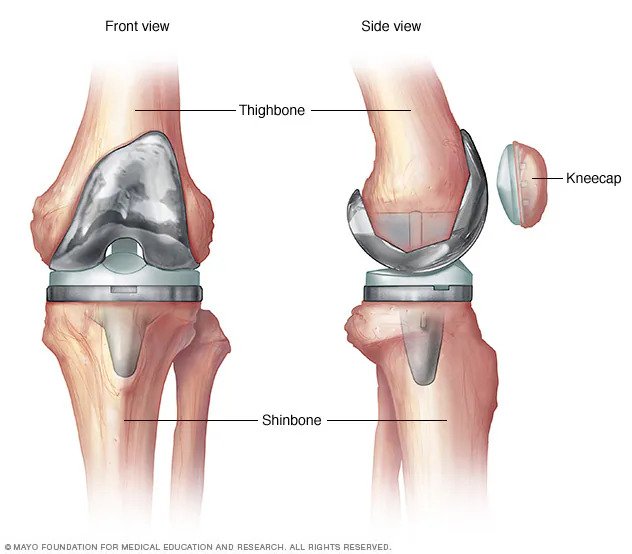Joint pain and mobility issues can significantly impact one’s quality of life, making even simple daily activities challenging. For individuals suffering from severe joint problems, joint replacement surgery offers a promising solution to regain mobility and alleviate pain. In Rajender Nagar, Ghaziabad, Dr. Bhavishya Handa’s clinic is a leading center for joint replacement surgeries, providing advanced and personalized care to patients. Joint Replacement Surgery in Rajender Nagar Ghaziabad is performed with the latest techniques and technologies, ensuring optimal outcomes for patients. This article explores the various aspects of joint replacement surgery, including its benefits, the types of surgeries available, the procedure, and post-operative care.
Understanding Joint Replacement Surgery
What is Joint Replacement Surgery?
Joint replacement surgery, also known as arthroplasty, involves removing damaged or diseased parts of a joint and replacing them with artificial components called prostheses. These prostheses are typically made of metal, ceramic, or plastic materials and are designed to mimic the natural movement of the joint. The surgery aims to restore function, reduce pain, and improve the overall quality of life for patients with severe joint conditions.
Common Reasons for Joint Replacement
Joint replacement surgery is commonly performed to treat conditions such as:
- Osteoarthritis: A degenerative joint disease that causes the breakdown of cartilage, leading to pain, swelling, and reduced mobility.
- Rheumatoid Arthritis: An autoimmune disorder that causes inflammation in the joints, resulting in pain and deformity.
- Trauma or Injury: Severe joint injuries or fractures that do not heal properly can lead to chronic pain and dysfunction.
- Avascular Necrosis: A condition where the blood supply to the bone is disrupted, causing bone tissue death and joint collapse.
Benefits of Joint Replacement Surgery
The primary benefits of joint replacement surgery include:
- Pain Relief: The most significant benefit is the alleviation of chronic pain that patients experience due to joint damage.
- Improved Mobility: Restoring joint function allows patients to move more freely and perform daily activities with ease.
- Enhanced Quality of Life: Reduced pain and improved mobility lead to a better overall quality of life and increased independence.
- Long-Lasting Results: Modern prostheses are designed to last for many years, providing long-term relief and function.
Types of Joint Replacement Surgeries
Hip Replacement Surgery
During hip replacement surgery, the injured hip joint is swapped out for an artificial one. There are two main types of hip replacement:
- Total Hip Replacement: The entire hip joint, including the femoral head (ball) and acetabulum (socket), is replaced with prosthetic components.
- Partial Hip Replacement: Only the femoral head is replaced, typically used for certain types of hip fractures.
Knee Replacement Surgery
Knee replacement surgery is performed to replace the damaged knee joint with a prosthetic one. Types of knee replacement include:
- Total Knee Replacement: Both the femoral (thigh bone) and tibial (shin bone) components, as well as the patella (kneecap), are replaced.
- Partial Knee Replacement: Only the damaged portion of the knee is replaced, preserving healthy bone and tissue.
Shoulder Replacement Surgery
Shoulder replacement surgery involves replacing the damaged shoulder joint with artificial components. Types of shoulder replacement include:
- Total Shoulder Replacement: The replacement of the glenoid (socket) and humeral head (ball) occurs.
- Partial Shoulder Replacement: Only the humeral head is replaced, typically for fractures or certain types of arthritis.
Elbow and Ankle Replacement Surgeries
While less common, elbow and ankle replacement surgeries are also performed to relieve pain and restore function in these joints. These surgeries involve replacing the damaged joint surfaces with prosthetic components.
The Joint Replacement Procedure
Pre-Operative Preparation
Before the surgery, patients undergo a thorough evaluation to ensure they are suitable candidates for joint replacement. This includes:
- Medical History and Physical Examination: A detailed review of the patient’s medical history and a physical examination to assess the joint’s condition.
- Imaging Studies: X-rays, MRI, or CT scans to determine the extent of joint damage and plan the surgery.
- Pre-Operative Testing: Blood tests, ECG, and other tests to evaluate the patient’s overall health and fitness for surgery.
The Surgical Procedure
The joint replacement surgery typically involves the following steps:
- Anesthesia: The patient is given either general anesthesia (puts the patient to sleep) or regional anesthesia (numbs the lower half of the body).
- Incision: A surgical incision is made over the affected joint to access the damaged area.
- Removal of Damaged Tissue: The damaged or diseased bone and cartilage are removed, and the joint surfaces are prepared for the prosthesis.
- Placement of Prosthesis: The artificial joint components are implanted and secured in place. The surgeon ensures proper alignment and movement of the prosthesis.
- Closure: The incision is closed with sutures or staples, and a dressing is applied to protect the surgical site.
Post-operative care and Rehabilitation
Post-operative care is crucial for a successful recovery and optimal outcome. This includes:
- Pain Management: Medications are prescribed to manage post-operative pain and discomfort.
- Physical Therapy: A structured physical therapy program is essential to regain strength, flexibility, and function in the joint.
- Wound Care: Proper care of the surgical site to prevent infection and promote healing.
- Follow-Up Visits: Regular follow-up appointments with the surgeon to monitor progress and address any concerns.
Choosing Dr. Bhavishya Handa for Joint Replacement Surgery in Rajender Nagar Ghaziabad
Expertise and Experience
Dr. Bhavishya Handa is a highly skilled and experienced orthopedic surgeon specializing in joint replacement surgeries. Having years of expertise and a dedication to quality, Dr. Handa has successfully performed numerous joint replacement surgeries, helping patients regain their mobility and improve their quality of life.
State-of-the-Art Facility
Dr. Bhavishya Handa’s clinic in Rajender Nagar, Ghaziabad, is equipped with state-of-the-art facilities and advanced technology. This ensures that patients receive the highest standard of care in a comfortable and safe environment.
Personalized Care
At Dr. Handa’s clinic, every patient receives personalized care tailored to their specific needs and conditions. From the initial consultation to post-operative care, Dr. Handa and his team are dedicated to providing comprehensive and compassionate care.
Comprehensive Rehabilitation
Successful joint replacement surgery requires a comprehensive rehabilitation program. Dr. Handa works closely with experienced physiotherapists to develop individualized rehabilitation plans that help patients achieve the best possible outcomes.
Conclusion
Joint replacement surgery is a highly effective solution for individuals suffering from severe joint pain and dysfunction. In Rajender Nagar, Ghaziabad, Dr. Bhavishya Handa’s clinic offers advanced joint replacement surgeries with a focus on personalized care and optimal outcomes. Whether you are dealing with hip, knee, shoulder, elbow, or ankle joint issues, Dr. Handa’s expertise and state-of-the-art facilities ensure that you receive the best possible treatment. Joint Replacement Surgery in Rajender Nagar Ghaziabad is designed to provide patients with relief from chronic pain and restore their mobility and function. If joint pain is affecting your quality of life, consider consulting with Dr. Bhavishya Handa to explore the benefits of joint replacement surgery and take the first step towards a pain-free and active life.
For further inquiries about Orthopaedic, please visit drbhavishyahanda.com and also follow us on Instagram


